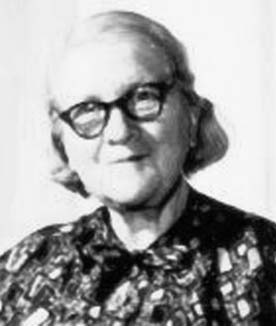Rózsa Péter facts for kids
Rózsa Péter (born Rózsa Politzer) was a brilliant Hungarian mathematician. She was born on February 17, 1905, and passed away on February 16, 1977. She is often called the "founding mother of recursion theory". This is a special area of math that helps us understand how computers work.
Contents
Early Life and Learning
Rózsa Péter was born in Budapest, Hungary. She first studied chemistry at Pázmány Péter University. This university is now known as Eötvös Loránd University. Later, she changed her focus to mathematics. She learned from famous professors like Lipót Fejér.
At university, she met László Kalmár. He was a friend who encouraged her love for math. They even worked together on projects later on.
After finishing her studies in 1927, Rózsa Péter faced a challenge. She had passed her exams to teach math. But it was hard to find a full-time job. This was because of the Great Depression. Many people, even university graduates, struggled to find work. So, Rózsa Péter started giving private lessons. She also began her advanced studies in math.
Her Work and Discoveries
Starting Her Research
Rózsa Péter first began studying number theory. This is a branch of math that looks at numbers and their properties. She soon found that other mathematicians had already proven her ideas. So, she stopped doing math for a short time. She even thought about focusing on poetry instead.
But her friend, László Kalmár, convinced her to return to math. He suggested she look into the work of Kurt Gödel. Gödel had a famous theory about "incompleteness." Rózsa Péter then found her own ways to prove some of Gödel's ideas.
Becoming a Pioneer in Recursion Theory
In 1932, Rózsa Péter shared her work at a big math meeting. It was called the International Congress of Mathematicians. Her paper was about "recursive functions." This was a new and important area of math.
She continued to work on this topic. In 1933, she helped write a chapter for a math book. Her main findings were included in this book. She also published several articles in a top math journal. In 1934, she changed her last name from Politzer to Péter. This was because of laws affecting Jewish people at the time.
In 1935, she earned her PhD with the highest honors. The next year, she presented another paper at the International Congress of Mathematicians. Her work helped create the modern field of recursion theory. This became a separate and important area of math research.
Challenges and a Special Book
In 1937, she became an editor for a math journal. But in 1939, new laws in Hungary made it hard for her. Because she was Jewish, she was not allowed to teach. She was also briefly held in a special area in Budapest.
During World War II, she wrote a special book. It was called Playing with Infinity: Mathematical Explorations and Excursions. This book was for everyone, not just mathematicians. It explained ideas about numbers and logic in a fun way. It was first published in Hungarian. Later, it was translated into many other languages.
Teaching and Later Career
After the war ended in 1945, Rózsa Péter got her first full-time teaching job. She taught at the Budapest Teachers’ Training College. In 1952, she made history. She was the first Hungarian woman to become an Academic Doctor of Mathematics.
When her college closed in 1955, she moved to Eötvös Loránd University. She taught there until she retired in 1975. Her students loved her and called her "Aunt Rózsa."
In 1951, she published her most important book, Rekursive Funktionen. This was the first book on modern logic written by a woman. It was later translated into English. She kept writing important papers on recursion theory throughout her life.
Connecting Math to Computers
From the mid-1950s, Rózsa Péter started to apply her work to computers. Her final book came out in 1976. It was called Rekursive Funktionen in der Komputer-Theorie. This means "Recursive Functions in Computer Theory." This book was very important for understanding how computers work. It was translated into English in 1981.
Awards and Recognition
Rózsa Péter received many honors for her amazing work.
- In 1951, she was given the Kossuth Prize.
- She received the Manó Beke Prize in 1953.
- She won the Silver State Prize in 1970.
- She received the Gold State Prize in 1973.
- Also in 1973, she became the first woman to be chosen for the Hungarian Academy of Sciences. This was a very high honor for a scientist in Hungary.
See also
 In Spanish: Rózsa Péter para niños
In Spanish: Rózsa Péter para niños


